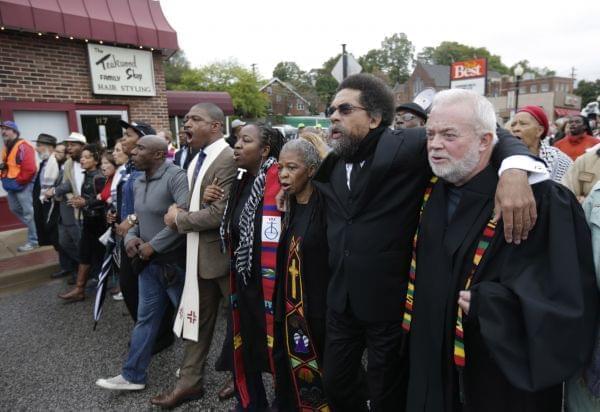Privacy Issues Complicate Body Cams For Illinois Police

Protesters, including Cornel West, second from right, march to the Ferguson, Mo., police station, Monday, Oct. 13, 2014, in Ferguson. Activists planned a day of civil disobedience to protest the shooting of Michael Brown, in August, and a second police shooting in St. Louis last week. (AP Photo/Charles Rex Arbogast)
The idea of requiring police to wear body cameras has been a hot topic after the protests in Ferguson, Missouri. On Friday, a group of Illinois lawmakers discussed the issue.
Advocates of body cameras say they can clear up the muddle of facts that often accompany police shootings, like the one in Ferguson. They also say police will be on better behavior if they know they're being watched.
Law enforcement elsewhere has jumped in, but Illinois' law on recording was struck down in court earlier this year.
State Rep. Elaine Nekritz, (D-Northbrook) said that leaves a lot of open questions about privacy — both for police and the citizens who would be recorded.
"Where is that data stored?" she asks. "How much of it is kept (and) for how long? And then who has access to it? Does the media have access to every interaction?"
There's also the question of whether police should notify everyone they talk to that they're on camera.
Nekritz says lawmakers are still in the early stages of debating the issue.
The Illinois House Judiciary Committee will meet Friday morning in downtown Chicago. State Sen. Kwame Raoul, a Chicago Democrat, co-chaired the hearing with Nekritz.
Raoul says it's important to talk about the use of cameras as lawmakers write eavesdropping legislation. The Illinois Supreme Court in March struck down the state's eavesdropping law, saying it is too broad.
UPDATE: Various police and law enforcement union representatives testified Friday at an Illinois House Judiciary Committee hearing in Chicago. They said they want to make sure privacy and cost issues are addressed before police start using the cameras.
The president of the Illinois Association of Chiefs of Police, Fred Hayes, says police are worried they will start using the cameras and then be confronted with legislation forcing them to scale back or abandon their use.
